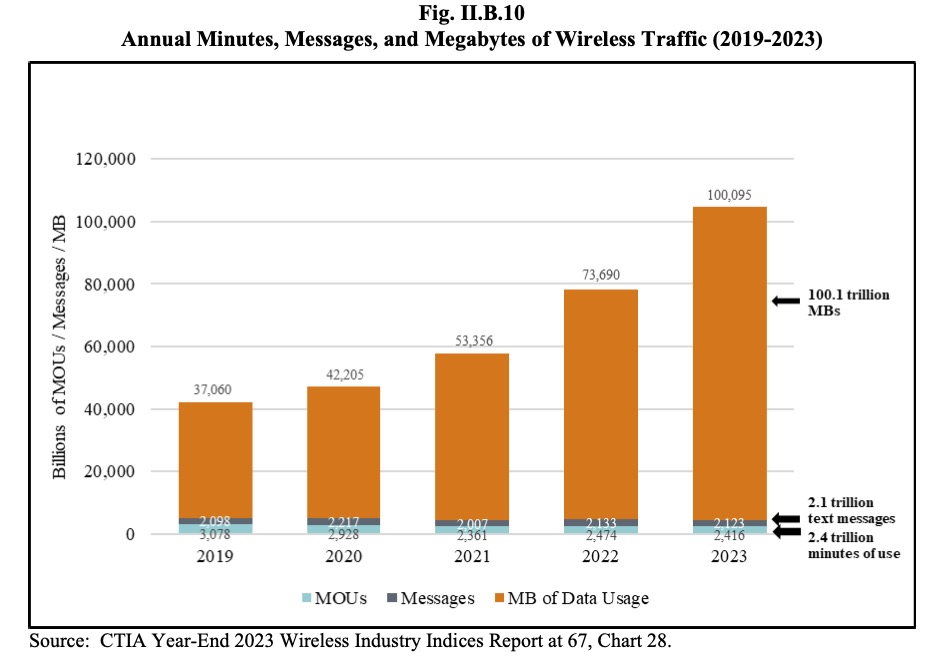In welcome news, on January 23, Rep. Rick Allen W. Allen announced the introduction in the House of Representatives of the Spectrum Pipeline Act of 2025. The Act, if it were to become law, would require the NTIA to identify at least 2,500 megahertz (MHz) of mid-band spectrum for reallocation from federal government use to non-federal or shared use in 5 years of the bill's enactment, including at least 1,250 MHz within the next 2 years.
Additionally, the Act renews the FCC's authority to conduct spectrum license auctions and issue licenses to bid winners. The Commission's authority lapsed in March 2023. Under the Act, the Commission would be required to auction at least 1,250 MHz of spectrum for full-power commercial wireless service within 6 years, and at least 600 MHz of that spectrum must be auctioned within 3 years.
Notably, the Act also requires the FCC to allocate at least 125 MHz of spectrum for unlicensed use, such as WiFi.
At the January 23 hearing on wireless technology held by the House Subcommittee on Communications & Technology, there appeared to be bipartisan unanimity on the conclusion that more spectrum needs to be put into use for licensed and unlicensed use and that the FCC's lapsed spectrum license auction authority should be restored promptly.
The Commission's 2024 Communications Marketplace Competition Report includes a chart by CTIA that shows the dramatic rise in mobile data traffic, and an unmistakable upward trend that will continue as more and more connected devices go into use and as data usage per subscriber continues to go up:
Additionally, the 2024 report observes that "[a] large proportion of mobile data traffic is delivered on an unlicensed basis through Wi-Fi, Bluetooth, and similar protocols." Furthermore: "Telecom Advisory Services asserts that the economic benefits associated with Wi-Fi in the United States will rapidly grow to $2.4 trillion in 2027, including an estimated $514 billion in consumer benefit, $624 billion in producer surplus, and $1,286 billion in GDP." And "[a]ccording to LightReading, the average Verizon subscriber offloads approximately 78% of their data onto Wi-Fi, for example, while Comcast subscribers offload approximately 94%." For other highlights from the report, see my Perspectives from FSF Scholars, "The FCC's 2024 Communications Marketplace Report: Time for a Broader View of Competing Broadband Services," published January 24, 2025.
Also important is the NERA study published on January 23 that estimates the tremendous economic value created through the allocation of spectrum for licensed use. For more on that, see my January 23 blog post, "Report: Putting Mid-Band Spectrum into Licensed Use Adds Billions to Economy."
The Spectrum Pipeline Act that Rep. Allen introduced is a companion to the similarly-titled bill from March 2024 that Senators Ted Cruz and John Thune sponsored. As Free State Foundation President Randolph May stated in a March 11, 2024, Media Advisory regarding the Senate bill from the last Congress:
No doubt there may be different views regarding the specific dates and amounts identified for reallocation contained in the bill. But there should be widespread agreement that it provides a good basis for moving forward promptly to develop a bipartisan, bicameral plan to address the nation's now-lagging spectrum efforts.
Everything President May said then applies with equal measure to the Spectrum Pipeline Act of 2025. Several months later, no substantial progress has been made on the wireless spectrum front. Timely action by Congress is even more important to get the desired result from having more spectrum in use. Rep. Allen deserves credit for filing the bill and undertaking efforts to make that happen.





